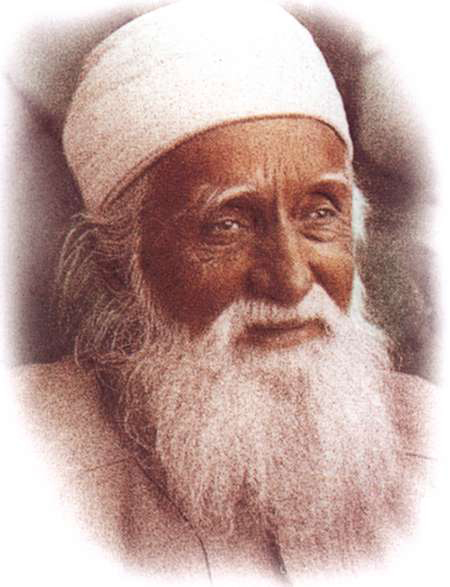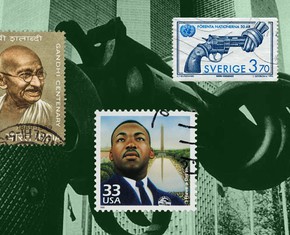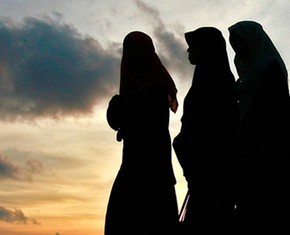The views expressed in our content reflect individual perspectives and do not represent the authoritative views of the Baha'i Faith.
You who are the servants of God fight against oppression, hate and discord, so that wars may cease and God’s laws of peace and love may be established among men. – Abdu’l-Baha, Paris Talks, p. 98.
To millions of Baha’is around the world, the name Abdu’l-Baha has a unique and profound meaning.

Abdu’l-Baha
As a reader of BahaiTeachings.org, you’ve no doubt seen numerous quotes from Abdu’l-Baha’s words and many examples from his life. A remarkable figure, unique in all religious history, Abdu’l-Baha’s name means “servant of Baha,” or “servant of the glory.” Abdu’l-Baha’s unprecedented role—as the Exemplar of the Baha’i teachings—makes him the role model for all Baha’is. In many ways, the Baha’i Faith today, one hundred seventy-two years after its beginnings, could not be fully understandable without the spoken and written words, and the examples set, by Abdu’l-Baha.
Born in Tehran, Persia on the auspicious date of May 23, 1844—the same day the Babi Faith began—his illustrious father Baha’u’llah named his firstborn child Abbas. Eight years later Abbas would visit his father in the prison called the Black Pit, where Baha’u’llah received the revelation that confirmed his mission as the prophet and founder of the Baha’i Faith. Abbas, the first to recognize Baha’u’llah’s station, served his father and his father’s Faith for his entire life. Even as a child Abdu’l-Baha mastered the Baha’i teachings, so Baha’u’llah singled out the title “Master” for his son while still a youth. Up until his own death Baha’u’llah gave his eldest son other names and titles such as “the Exemplar” and “the Mystery of God.”
Abdu’l-Baha was truly a mystery, because he was not a prophet of God—but rather a perfect Baha’i, the living example of the spiritual teachings of Baha’u’llah, “the remembrance of God amongst you and His trust within you…” wrote Baha’u’llah in his Tablet of the Branch.
If you study Abdu’l-Baha’s life of love and sacrifice, you’ll see that he spent more than half of it in prison with Baha’u’llah, and only obtained his release in 1908, sixteen years after Baha’u’llah’s named Abdu’l-Baha as his successor. After Baha’u’llah’s passing, Abdu’l-Baha was designated in his father’s written will as the Center of Baha’u’llah’s covenant, the person every Baha’i should turn to for guidance and inspiration.
In the history of religion, this has never happened before—a living prophet naming a successor.
The Master had long been a firm believer and trusted confidante. He served his father, family and the believers with distinction and devotion throughout Baha’u’llah’s life, after his passing, and during the early 20th Century establishment of Baha’i communities throughout the world. According to his grandson Shoghi Effendi, the Heroic, Apostolic Age of the Baha’i Faith ended with Abdu’l-Baha’s death in 1921.
Abdu’l-Baha said this about his name and his unique spiritual station:
My name is Abdu’l-Baha. My qualification is Abdu’l-Baha. My reality is Abdu’l-Baha. My praise is Abdu’l-Baha. Thralldom to the Blessed Perfection [Baha’u’llah] is my glorious and refulgent diadem, and servitude to all the human race my perpetual religion … No name, no title, no mention, no commendation have I, nor will ever have, except Abdu’l-Baha. This is my longing. This is my greatest yearning. This is my eternal life. This is my everlasting glory. – Abdu’l-Baha, quoted by Shoghi Effendi, The World Order of Baha’u’llah, p. 139.
Because the title Abdu’l-Baha literally means “servant of the glory,” or “servant of Baha’u’llah,” you can see the double meaning here in Abdu’l-Baha’s words. He firmly establishes his station as one of humble servitude, not only to the Baha’i teachings but to the Baha’is themselves, and to all the world. Abdu’l-Baha exemplified that servitude in his life and words. To Baha’is, Abdu’l-Baha, designated one of the three Central Figures of the Baha’i Faith, showed the world his true station through his innumerable acts of kindness and charity to others; through his global campaign for unity and peace; and through his powerful spiritual counsel to the entire planet.
One of Abdu’l-Baha’s missions, given to him by Baha’u’llah, was to spread the Baha’i teachings among the world’s people. In his travels across the Middle East, Europe, and North America, the Master proclaimed openly the teachings of this new worldwide religion, with the pivot the unification of the entire human race. In hundreds of recorded talks and in innumerable settings, Abdu’l-Baha left a legacy of tens of thousands of documents for posterity, relied upon by the Baha’is as explanations of the import and breadth of the Baha’i teachings on the future of society and the spiritual destiny of humankind.
The Master, as amply illustrated by his many talks and letters, always encouraged and never disparaged. His words and actions always uplifted and never depressed, always stayed positive and never turned negative. To all Baha’is, Abdu’l-Baha’s words hold binding and authoritative meaning, guiding a global community in their conduct and outlook.
For Baha’i writers, the entire body of believers, and the entire world, the words and life of Abdu’l-Baha not only serve as sources of wisdom and guidance, but act as the practical example and encouragement needed to “change this darksome world to light.”
You May Also Like
Comments

















This 41 words i framed it in my mind, commit it to memory to practice, to correctly practice and be able to perfectly practice right in our heart so that it becomes a permanent file that we can refer as we do the act in motion to our individual LIFE which i describe as "Living in ...Freedom Eternally/everday". By J-0n St Flav'or
.